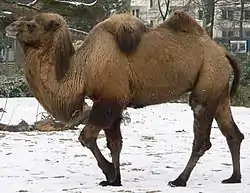camel
English

A Bactrian camel, Camelus bactrianus
.jpg.webp)
A convoy of camels in the Jordan Rift Valley
Etymology
From Middle English camel, through Old Northern French camel (Old French chamel, modern French chameau), from Latin camēlus, from Ancient Greek κάμηλος (kámēlos), from a Semitic source, ultimately from Proto-Semitic *gamal-; compare Arabic جَمَل (jamal) and Hebrew גמל (gamál).
Pronunciation
- IPA(key): /ˈkæməl/
Audio (Australia) (file) Audio (GA) (file) - Rhymes: -æməl
- Hyphenation: ca‧mel
Noun
camel (plural camels)
- A beast of burden, much used in desert areas, of the genus Camelus.
- A light brownish color, like that of a camel.
- camel colour:
- Loaded vessels lashed tightly, one on each side of another vessel, and then emptied to reduce the draught of the ship in the middle.
Synonyms
- (mammal): oont (India (Anglo-Indian), Australia, colloquial)
Coordinate terms
Derived terms
Derived terms
Related terms
Translations
beast of burden
|
|
Adjective
camel (not comparable)
- Of a light brown color like that of a camel.
- 1999, New Woman, volume 29, page 212:
- […] try to select accessories that are in the same color family as your coat," says millinery designer Patricia Underwood. To pick up the weave of a brown tweed jacket, for instance, choose a camel hat and black gloves.
- 1999, New Woman, volume 29, page 212:
Middle English
Alternative forms
Etymology
From Old Northern French camel, cameil, from Latin camēlus. Some forms are from or influenced by Old French chamel, chamoil.
Pronunciation
References
- “camē̆l (n.)” in MED Online, Ann Arbor, Mich.: University of Michigan, 2007, retrieved 2018-06-1.
Old French
Etymology
See chamel.
Noun
camel m (oblique plural cameus, nominative singular cameus, nominative plural camel)
- (Old Northern French, Anglo-Norman) camel
This article is issued from Wiktionary. The text is licensed under Creative Commons - Attribution - Sharealike. Additional terms may apply for the media files.